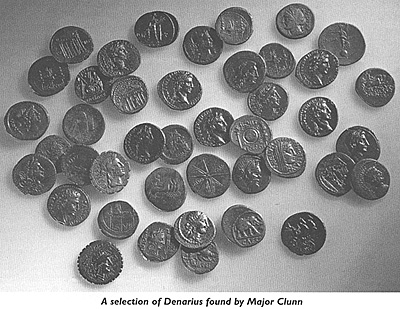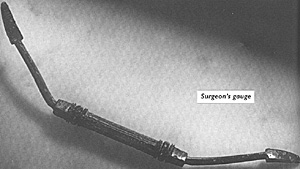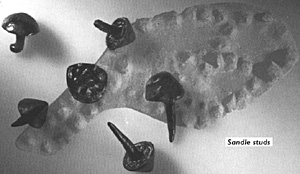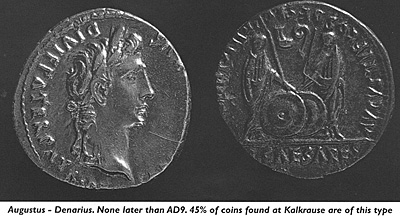 Every now and again, we are fortunate enough to receive an article that is, at the same time, historically fascinating and a damned good read. This is one such. Major Clunn speaks of himself in the third person but, as the story reveals, he was very much involved in the first person.
Every now and again, we are fortunate enough to receive an article that is, at the same time, historically fascinating and a damned good read. This is one such. Major Clunn speaks of himself in the third person but, as the story reveals, he was very much involved in the first person.
In late summer, September, in the year AD9, in the upper reaches of the Teutoburger range of rills and forests of Northern Germany, some 20,000 Legionaries and some 2,000 auxiliaries were either slaughtered, or captured and executed by German tribesmen. It was the greatest defeat ever suffered by Rome. But when Marabodus, a tribal chieftain in south west Germany received the head of Varus as a salutation from Arminius, he thought it wiser to stand by his treaty with Rome, and the head was forwarded to Augustus Caesar, who performed .he funeral rites for his defeated General.
Augustus had gently unwrapped the head from the red cloak, and placed it on a candle lit altar. As he carried out the religious ceremony, his words echoed down through the annals of history "Quinctilius Varus, give me back my Legions!"
Background
Augustus Caesar had pushed the frontiers of Roman dominion outward in almost every direction. The frontier between the subject province of Gaul and barbarian Germany was to prove especially troublesome, and the whole might of Rome, eventually was to be challenged by one barbarian leader, Arminius, of the Cherusci tribe. But Arminius, whom Tacitus called the liberator of Germany, was not the first German to threaten Rome. Previously, after pushing the Roman armies as far south as Orange, in the Gallo-Roman province of Narbonesis, the German proceeded toward Italy itself. They were stopped, however by one of Rome's outstanding generals. Marius, who defeated them at Aix-en-Provence in 102 BC and obliterated them atVercellie the following year.
Germanic pugnacity engraved itself upon the Roman mind and tongue: a man of ferocious character was called `Cimber', and the `furor Teutonicus' was spoken of long after the tribe had disappeared. Although there was nothing yet approaching a German nation, Rome remained highly conscious of this mass of Germanic peoples in northern Europe. the line of demarcation between the Celts in Gaul and the Germanic tribes to the east was vague, and though the Celts tended to concentrate west of the Rhine, there was still a lot of German blood and influence in that region.
Then in 58 BC Julius Caesar entered the picture. The territory of which he was governor included not only the Adriatic coast and what is now north Italy but also the province of Gallia Narbonensis. Caesar picked a quarrel with Ariovistus, a German leader influential in Gaul. He then proceeded to annex all Gaul, establishing the Rhine as the frontier between Roman and on-Roman land. And so Caesar crystallised the idea of a subject Gaul west of the Rhine and a free Germany east.
Half a century Iater, Augustus gradually pushed Rome's eastern European frontier to the Danube. But a frontier consisting of the Rhine and the Danube made a very long and devious line, including a right angle along their upper courses. An Elbe-Danube line would be a great deal shorter, communications would be easier and potentially hostile tribesmen would be safely enclosed within the Empire. So Augustus' younger stepson, Drusus, crossed the Rhine to fight four successive campaigns in Germany. He reached the Weser and finally, in 9 BC, the Elbe. The Romans built a fortress, and the entire area from the Rhine to the Elbe was regarded as a new Roman province.
The Germans were, for the most part, semicivilized pastoral nomads. Tacitus, in his Germania, vividly describes these people with their wild blue eyes, reddish hair, and hulking bodies, politically unstable tribesmen who loved a fight but disdained work. The Romans hated their new province, "bristling with woods or festering with swamps", but Roman influence gradually seeped in, and modern excavations show that a good deal of trade was conducted.
One Roman governor after another fought laborious campaigns to consolidate the new conquests and frontiers. The greatest weakness lay in the fact that the shorter Elbe-Danube frontier could be completed until Bohemia (now Czech Republic) was conquered too.
 This became obvious when an astute German chief, Marobodus, led his entire Marcomannic tribe on a migration from occupied south-western Germany into free Bohemia and established authority over the German tribes of Saxony and Silesia. The Roman government decided that it was imperative to put a stop to the expansion of Marobodus. In AD 6, therefore, twelve legions were launched in a massive three-pronged invasion under the supreme command of Augustus' elder stepson and heir apparent, Tiberius. But a huge revolt broke out in northern Yugoslavia, putting an end to the campaign against Marobodus. Nevertheless, the tribal chieftain very sensibly came to terms with Rome and was recognised as a king and as a friend of the Roman people. Meanwhile, the Yugoslavian revolt, described as Rome's gravest foreign threat since Hannibal, took three years to suppress.
This became obvious when an astute German chief, Marobodus, led his entire Marcomannic tribe on a migration from occupied south-western Germany into free Bohemia and established authority over the German tribes of Saxony and Silesia. The Roman government decided that it was imperative to put a stop to the expansion of Marobodus. In AD 6, therefore, twelve legions were launched in a massive three-pronged invasion under the supreme command of Augustus' elder stepson and heir apparent, Tiberius. But a huge revolt broke out in northern Yugoslavia, putting an end to the campaign against Marobodus. Nevertheless, the tribal chieftain very sensibly came to terms with Rome and was recognised as a king and as a friend of the Roman people. Meanwhile, the Yugoslavian revolt, described as Rome's gravest foreign threat since Hannibal, took three years to suppress.
The new province of Germany watched these events with rising excitement. The Romans were not, after all, infallible; they had been compelled to spare Marobodus. Prolonged resistance to their power was not beyond the bounds of possibility. These were the circumstances when a new Roman governor, Publius Quinctilius Varus, reached Germany. Husband of Augustus' grandniece, Varus was among the Emperor's closest friends and had a hard-won reputation for- firmness and order. When he arrived in Germany, however, he miscalculated the situation. He regarded the country as already subjugated and believed he could impose civilian methods of control such as were possible in the rich well-organised provinces he had hitherto governed.
The third-century Greek historian Cassius Dio described the situation: "The Romans held portions of the country, not entire regions but such districts as happened to have been subdued. The soldiers wintered there, and cities were being founded. Gradually the barbarians adapted themselves to Roman ways, getting accustomed to holding markets, and assembling peacefully.
But they had not forgotten their ancestral ways, their inborn nature, their old proud way of life, their freedom based on arms. As long as they were unlearning their ancient customs gradually and as it were by degrees, they did not protest against these changes in their mode of life, so gradual, they were hardly aware of them. But when Quinctilius Varus was appointed governor of the area and in the course of his official duties attempted to take these people and strive to change them, issuing orders as though they had already been subdued and exacting money as from a subject nation, their patience was exhausted."
Eariler, in AD4,Tiberius, at that time Governor of Germany, had given an important West Germanic tribe, the Cherusci, the privileged position of a federated state within the Empire. Members of their ruling class, among them the young prince Arminus, were made Roman citizens. Arminius entered the imperial service as an officer in its auxilary military forces, gaining the status of a Roman knight.
By 9BC it seemed that Augustus' ambition to extend Roman territory to the Elbe had almost been achieved. But the Romans overestimated the extent to which they had successfully assimilated their new province. Encouraged by revolts in the Empire, German aspirations to freedom and prowess in arms both found their champion in Arminius. His knowledge of the terrain made a German victory strong possibility; an annihilation of the legions sent to maintain order shook the Empire to its core. Rome was forced to abandon any idea of a province beyond the Rhine, and the implications for the future of Europe were incalculable.
The Cherusci, whose territory reached almost to the Elbe, played a leading part in the arrangements of Varus. Like his predecessors, Varus proposed to winter on the Rhine and spend the summer at advanced posts far inside the recently conquered province. And so in AD 9 he established a summer camp for his three legions (6,000 men in each) in Cheruscan territory. Two legions were left behind on the Rhine. His advance headquarters was on the west bank of the Weser. Varus befriended the Cheruscan chiefs, Segestes, and his brother Segimerus, little realising that Arminius and Segimerus were even then plotting against him.
Some of the chiefs, in particular Segestes, tried to warn the governor of this impending treachery, but Varus was persuaded to lend the conspirators legionary detachments, which they said they needed to guard certain posts and escorts supplies for the Roman army. Moreover, when the time came forVarus to withdraw to the Rhine for the winter, the plotters persuaded him to change his route. He had intended to march back to his winter camp at Vetera by the military road, but the fictitious report of a local rising induced him to made a northwesterly detour through difficult wooded country. The conspirators saw the main army off from their summer camp on the Weser. As Varus took his leave, they asked for and received permission to rejoin their tribes -- ostensibly to recruit men to help put down the revolt that they had invented.
The Roman column moved slowly. It was encumbered by a heavy baggage train and large numbers of women, children and servants. As it proceeded through the rough country, felling trees and making paths and causeways, a shower of missiles suddenly descended. The Germans were attacking. The legionaries were hampered by the wind, rain and mud that had always made them dislike Germany. They were short of auxiliaries -- cavalry riders, archers and slingers -- to strike back effectively. All they could do was press on and hope to reach the nearest fortress.
Discipline asserted itself sufficiently for a camp to be pitched for the night on high ground. Wagons and baggage were burned or jettisoned and next morning the march was resumed. The legions started off in better order over open country, but this left them vulnerable to German attached, and they were again compelled to take refuge in the woods, where they spent a most disagreeable day struggling through obstacles.
 They suffered heavy losses, some of them self-inflicted because of the difficulty of distinguishing enemy from friend. In the night they managed to huddle together in another makeshift camp, with a totally inadequate rampart.
They suffered heavy losses, some of them self-inflicted because of the difficulty of distinguishing enemy from friend. In the night they managed to huddle together in another makeshift camp, with a totally inadequate rampart.
When morning came, it was still raining, there was a biting wind and they could see that the Germans had received reinforcements. It was reported that one of the commanders of the Legions, Numonius Vala, lost his nerve and rode off with the remains of his Regiment and auxiliary riders in the vain hope of reaching the Rhine. Varus was suffering from wounds. He fully realised what the Germans would do to him if they caught him alive. To avoid this fate, he killed himself. Some members of his staff followed his example, and the two generals who were left in charge did not long survive. One mistakenly offered capitulation, which turned into a massacre; the other fell fighting as the Germans broke into the last encampment. Just as first light made its first attempts on the day, the remnant of the three Legion force, possibly only a few thousand Legionaries, perhaps under command of one of the few remaining legion commanders, escaped under cover of darkness to flee towards the west and the safety of the River Ems. They only partly succeeded in their bid to escape, running straight into a well planned back-stop ambush established by Arminius at the point where the northern edge of the nearby Berglands fell steeply down into a narrow gap between the hilly ground, and the boggy moorlands beyond. It was a perfect pincer movement, and with the exception of a few handfuls of fleeing legionaries, all were slain.The entire Roman force, possibly up to some 20,000 men in all, was slaughtered. Even those who were captured met their terrifying end at the hands of the German tribesmen, who took great pleasure in slowly torturing their prisoners to a grisly death.
The disaster upset Augustus more than anything in his long life, and he took every counter measure that he could think of. He dismissed all the Germans and Gauls in his personal bodyguard. Determined efforts were made to replace the lost legions, but few recruits of military age were available. Finally a force consisting mainly of retired soldiers and former slaves (who were not normally admitted to the legions) was entrusted to Tiberius, who had rushed back from Dalmatia. He led them to the Rhine to join the remaining two legions and defend the entire line of the border.
As had been feared, the triumphant Germans swept on toward the Rhine. All the advance forts to the east of the river, except Aliso, fell without resistance. Aliso's commander and a force of archers succeeded in holding out until their stores were exhausted. Then on a dark night, the garrison slipped out -- women, children and all -- and managed to make its way to the winter camp at Vetera on the Rhine. There they found the province's two remaining legions, which Varus' nephew (and Legate) Lucius Asprenas, had hastily brought north from Mainz.
The Germans did not, however, manage to approach the Rhine. Deterred by Asprenas and delayed before the ramparts of Aliso, they lost any chance of mounting a surprise attack. Moreover, an attempt by Arminius to convert his rebellion into a national German revolt came to nothing. Such a revolt as contingent upon the support of Marobodus, whom Arminius tried to intimidate in a gruesome manner. His men had come upon some of the Romans cremating the body of Varus in the Teutoburger Forest. They seized what was left of the corpse and mutilated it. They cut off the head and sent it to Marobodus, appealing to him to join the insurrection. but he saw no advantage in harnessing himself to the ambition of Arminius. It seemed wiser to stand by his treaty with Rome. The head of Varus was forwarded to Augustus, who performed the funeral rites.
Five years later Augustus died. Shortly before his death he sent his brilliant young grandnephew, later called Germanicus, to take command on the Rhine. When Tiberius came to the throne in AD 14, Germanicus fought three massive and expensive campaigns against the Cherusci. A long-standing quarrel between Arminius and his pro-Roman father-in-law Segestes flared anew, with Germanicus siding with Segestes. Arminius' wife fell into Roman hands, and although Arminius himself was urged by his bother to collaborate with Rome, he refused.
The following summer in AD 15, some six years after the defeat of the Varus Legions, Germanicus formed the idea -- according to his Uncle Tiberius a very demoralising one -- of taking his troops to visit the site. The occasion provided Tacitus, the great historian, with one of his highlights:
- Now they were near the Teutoburgian Woods, in which the remains ofYarus and his three legions were said to be lying unburied. Germanicus conceived a desire re to pay his last respects to these men and their general. Every soldier with him was overcome with when he thought of his relations and friends - and reflected on the hazards o f was and o f human - life. Caecina was sent ahead to reconnoitre the dark woods and build bridges and causeways on the treacherous surface of the sodden marshland. Then the army made its way over the tragic sites.
The scene lived up to its horrible associations. Varus' extensive first camp, with its broad extent and headquarters marked out, testified to the whole army's labours. Then a half-ruined breastwork and shallow ditch showed where the last pathetic remnant had gathered. In the openwere whitening bones, scattered where men had fled, heaped up where they had stood and fought back. Fragments of spears and of horses' limbs lay there -- also human heads, fastened to tree-trunks. In groves nearby were the outlandish altars at which the Germans had massacred the Roman colonels and senior company commanders.
 Survivors of the catastrophe, who had escaped are battle or from captivity, pointed out where generals had fallen, and where the Eagles were captured. They showed where Varus received his first wound and where he died by his own unhappy hand. They told of the platform from which Arminius
had spoken, and of his arrogant insults to the Eagles and standards -- and of all the gibbets and pits for the prisoners."
Survivors of the catastrophe, who had escaped are battle or from captivity, pointed out where generals had fallen, and where the Eagles were captured. They showed where Varus received his first wound and where he died by his own unhappy hand. They told of the platform from which Arminius
had spoken, and of his arrogant insults to the Eagles and standards -- and of all the gibbets and pits for the prisoners."
Germanicus gathered his commanders together and gave his orders: 'Gather all the remains of our fallen brothers, from the beginning to the end here, clean the whole area, take down the gibbets and platforms, take all up into a high place near here, and dig a grave with a funeral pyre. Light the fires and let us lay the ghosts of our brothers to rest. There is no merit in this place,- it is not a place to honor and let us be soon gone from here - and let the mists of time cloud its very existence..:'
Soon after a great battle was fought between Arminius and Germanicus' legions at Idistaviso, south of the main pass at Minden where Varus' summer camp had been established. Germanicus claimed the victory, despite the fact that his Legions and auxiliaries had been forced to retreat and regroup, as had Arminius' now diminished force. But the Germans were far from subjugated.
It was some years later in Ad 19 that Arminius picked a quarrel with Marobodus, the German who had snubbed him, and a battle ensued. Although the outcome was indecisive, Marobodus lost much of his power, and soon afterwards his Bohemian kingdom lost it independence. But Arminius' end was also at hand, as Tacitus describes:
"I find from the writings of contemporary senators, that a letter in the Roman senate from a chieftain of the Chatti tribe, Adgandestrius by name, offering to kill Arminius if poison were sent to him for the job. The reported answer was that Romans take vengeance on their enemies, not by underhanded tricks, but by open force of arms."
However, the Roman evacuation of Germany and the fall of Maroboduus had induced Arminius to aim at Kingship. But his freedom-loving compatriots forcibly resisted. The fortunes of the fight fluctuated. Arminius finally fell victim to treachery from his relations; he was killed, probably poisoned, by members of his own family.
He was unmistakably the liberator of Germany. Challenger of Rome -- not in its infancy, like kings and commanders before him, but at the height of its power -- he had fought undecided battles, but never lost a war. He had ruled for twelve of his thirty-seven years. To this day the tribes sing of him. Yet Greek historians ignore him, reserving their admiration for Greece. We Romans, too, underestimate him, since in our devotion to antiquity we neglect modern history.
Tacitus was justified in calling Arminius the man who had freed Germany. He was not, however, a national chief. "He was only," wrote another historian, "the leader of a faction even among his tribesmen, not a champion of the German nation, for no such thing existed. The very name was of recent date, an alien appellation; there was among the Germans little consciousness of a common origin, of a common interest none at all."
Still, it was thanks to his extraordinary skill and courage that the Romans were excluded, from then on, from Germany across the Rhine. With the exception of a coastal strip and a tract on the upper Rhine and Danube, the province was abandoned. The Romans were forced to recognise that annexation was impossible or inadvisable. They were to treat trans-Rhine Germany as a client state, dependent economically, but nothing more.
Had Arminius not frustrated Augustus in his aim to establish a Elbe-Bohemia-Danube frontier, almost the whole of the present Federal Republic of Germany and the Czech area of Czechoslovakia would have been parts of the Roman Empire. "Might-have-beens" are notoriously unprofitable, but it is likely that in the end these territories, under Roman rule, would have become as docile and Latinised as Gaul. Any idea of the Rhine as a frontier would have been irrelevant and forgotten. The whole concept of Germany would have been unimaginably different, and so therefore, would every subsequent century of European History.
The Varus Battle In Quest of the Lost Roman Legions
- Background and Battle
Modern Research
Map (slow: 173K)
Jumbo Map (extremely slow: 435K)
More Artifact Photos (slow: 189K)
Back to Battlefields Vol. 2 Issue 1 Table of Contents
Back to Battlefields List of Issues
Back to Master Magazine List
© Copyright 2004 by Partizan Press.
This article appears in MagWeb.com (Magazine Web) on the Internet World Wide Web.
Other articles from military history and related magazines are available at http://www.magweb.com